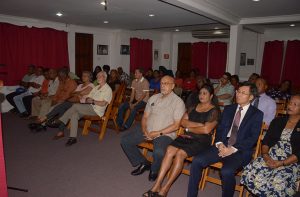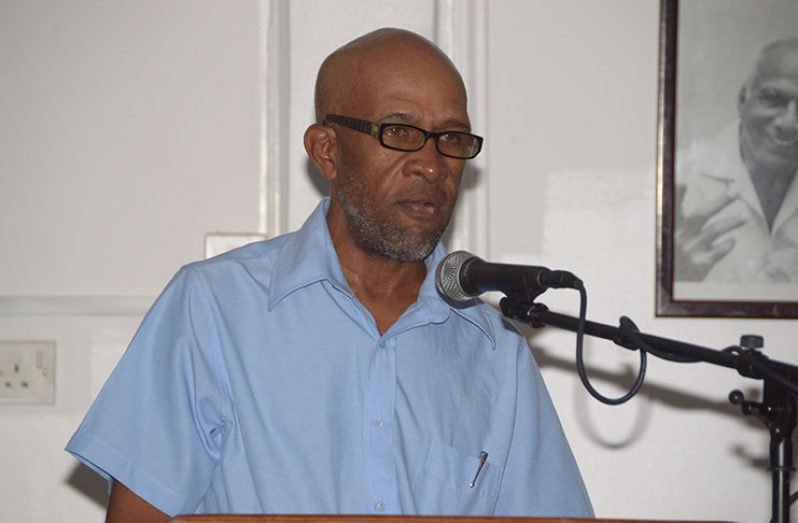…says politicians conveniently praise, criticise local media
AT the a panel discussion on press freedom hosted by the Guyana Peace Council (GPC) on Wednesday, stalwart journalists presented their positions on what is needed for the local press to truly fulfil its mandate.
The panel discussion took place at the Cheddi Jagan Research Centre (CJRC)/ Red House and saw remarks coming from former President of the Guyana Press Association (GPA), Neil Marks; National Communication Network (NCN) Chairman, Enrico Woolford; and Demerara Waves Publisher, Denis Chabrol.
World Press Freedom Day was celebrated on May 3, 2019 and, this year, takes on the theme: ‘Media for Democracy: Journalism and Elections in Times of Disinformation.’ In his presentation to the audience, Chabrol first acknowledged that throughout Guyana’s history, the press has been conveniently praised and criticised by political parties for political or personal gain.
Such actions, he stated, rob the Guyanese public of the right to make well-informed decisions. Public-owned media houses which are considered credible, non-biased and unaligned to political parties, are what Chabrol listed as the greatest need today for the press in Guyana.
He stated that these needs transcend traditional media and must also be applied to social media platforms which have become a main source of information sharing.
“In this era of fast-paced movement of audio, video and text, Guyana and Guyanese cannot just confine themselves to traditional channels of radio, television and newspapers. What we can and ought to do is apply the same globally-accepted rules of journalism in disseminating and consuming journalism products. Failing to do so, will result in us as a nation pandering to rumour, gossip and even chaos,” Chabrol cautioned.
The publisher spoke against censorship, propaganda and called for recognition by politicians that the press is crucial to democracy and ought not to be intimidated into subjection.

Meanwhile, in his remarks, Marks reminisced on his career in the media and the many experiences of “racial fermentation” which have affected the press.
He pinpointed the election period in Guyana as a time in which racism consistently shows its ugly head and stated that it was not until the 2006 elections that the media was able to turn the tide of high violence during the period.
“I think that marked the beginning of the first non-violent election in Guyana’s history and, thankfully, that has continued. Much of that was a result of the work that the media did in a very large part,” he said.
Marks explained that earlier, in 2001, the general media had agreed to sign on to a Code of Conduct which would see them practicing self-regulation and producing content free of racial hostility.
Stating that he does not believe that Guyana has been completely freed of “racial fermentation” during the elections period, he called on the private sector to invest in funding training for journalists for the improvement of the local profession.
In his remarks, Woolford stressed the need for journalists to report on investigated facts rather than simply regurgitating information.
He stated that in order to make informed decisions, journalists must first be informed and must transfer this knowledge to the public so that they can make informed decisions.
“The media ought to be pursuing facts where we investigate,” he advised.
“We have to look at the portrayals, the position and the perceptions that are driven by the concerns of those who want to be heard.”
Making brief remarks was United Nations Development Programme (UNDP) Resident Representative to Guyana, Mikiko Tanaka, who reminded the attendees of the role and ethical responsibilities of the press.
With the election period in mind, she acknowledged that one of the greatest challenges of the media was figuring out how to report on inflammatory language during political campaigns. As such, Tanaka advised that journalists must decline to report on anything that is discriminatory, inflammatory or to be considered hate speech.
She also called on political parties to remember their roles and to create an environment which enables the media to fulfil its mandate.



.jpg)








